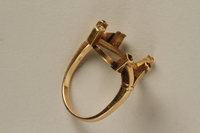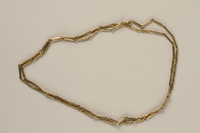Overview
- Description
- Collection of materials relating to Morris and Bronia Kirsch (donor's parents) and their life in the displaced persons camps after their liberation. The collection includes a photograph of them in the DP camp.
- Credit Line
- United States Holocaust Memorial Museum Collection, Gift of Sarah Kirsch
Physical Details
- Genre/Form
- Photographs.
- Extent
-
1 folder
Rights & Restrictions
- Conditions on Access
- There are no known restrictions on access to this material.
- Conditions on Use
- The Museum is in the process of determining the possible use restrictions that may apply to material(s) in this collection.
Keywords & Subjects
- Topical Term
- Holocaust survivors.
Administrative Notes
- Holder of Originals
-
United States Holocaust Memorial Museum
- Legal Status
- Permanent Collection
- Provenance
- Donated to the United States Holocaust Memorial Museum in 2008 by Sarah Kirsch
- Record last modified:
- 2022-07-28 17:51:27
- This page:
- https://collections.ushmm.org/search/catalog/irn36101
Download & Licensing
- Copyright Not Evaluated
- Terms of Use
- This record is not digitized and cannot be downloaded online.
In-Person Research
- Request 7 Days in Advance of Visit
- Plan a Research Visit
-
Request in Shapell Center Reading Room
Bowie, MD
Contact Us
Also in Bernice, Morris, and Sarah Kirsch collection
The collection consists of artifacts and a photograph relating to the experiences of Bronia and Morris Kirsch, and their daughter, Sarah, in a displaced persons camp after the Holocaust.
Date: 1945-1950

Gold ring with pink stones received by a refugee in a displaced persons camp upon the birth of her daughter
Object
Ring given to Bronia Kirsch in 1946 on the occasion of the birth of her daughter, Sarah, while she was living in the displaced persons camp in Ansbach, Germany. The ring has a setting for a large stone, but it was already missing when Bronia received the ring. She believed the stone had been removed by the Germans. She met and married Morris Kirsch, also a displaced person from Poland, in 1945 in Feldafing, Germany. The family emigrated to the United States in 1950.

Gold link chain necklace received by a refugee in a displaced persons camp upon the birth of her daughter
Object
Necklace given to Bronia Kirsch in 1946 on the occasion of the birth of her daughter, Sarah, while she was living in the displaced persons camp in Ansbach, Germany. She met and married Morris Kirsch, also a displaced person from Poland, in 1945 in Feldafing, Germany. The family emigrated to the United States in 1950.

Sewing case with six ornate gold mending tools
Object
Sewing case, with a Parisian jeweler's plate, with a needle case, sewing needle, thimble, scissors, seam ripper, and darning needle received by Morris Kirsch while he was living in the displaced persons camp in Ansbach, Germany, after World War II. The kit was originally from France. In 1939, when the Germans occupied Łódź, Poland, Morris was assigned as forced labor in the ghetto making uniforms for the German army. In 1943, the Germans transferred him through a series of forced labor and concentration camps. He was liberated by American troops in April 1945. He was sent to the Feldafing displaced persons camp, where he met and married Bronia Bergman. The couple was then housed in Ansbach. They had a daughter, Sarah, in 1946. The family emigrated to the United States in 1950.



